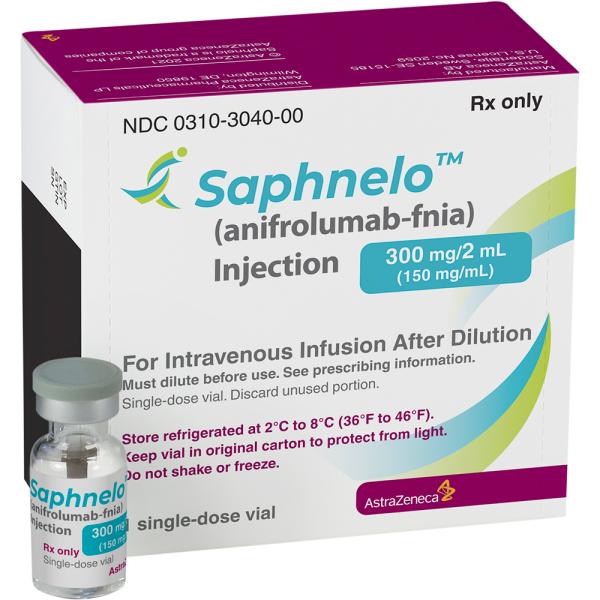Anifrolumab Side Effects
Medically reviewed by Drugs.com. Last updated on Nov 15, 2023.
Applies to anifrolumab: intravenous solution.
Precautions
It is very important that your doctor check your progress closely and at regular visits to make sure this medicine is working properly and to decide if you should continue to receive it. Blood tests may be needed to check for unwanted effects.
Tell your doctor if you are pregnant or planning to become pregnant during treatment with this medicine.
Do not have any live vaccines (immunizations) while you are being treated with anifrolumab-fnia. Check with your doctor before having any vaccines.
This medicine may cause serious infections (eg, lung infection, herpes zoster). Check with your doctor right away if you have cough, fever, painful blisters on the trunk of the body, sneezing, or sore throat.
Anifrolumab-fnia may cause infusion reactions, which can be life-threatening and require immediate medical attention. Tell your doctor right away if you start to have a fever, chills or shaking, dizziness, trouble breathing, itching or rash, lightheadedness or fainting, after receiving this medicine.
This medicine may cause serious allergic reactions, including anaphylaxis and angioedema, which can be life-threatening and requires immediate medical attention. Tell your doctor right away if you have a rash, itching, large, hive-like swelling on the face, eyelids, lips, tongue, throat, hands, legs, feet, or sex organs, hoarseness, trouble breathing, trouble swallowing, or any swelling of your hands, face, or mouth after using this medicine.
Using this medicine may increase your risk of getting cancer. Talk to your doctor if you have concerns about this risk.
Tell your doctor if you are also receiving other biologic treatments.
Serious side effects of anifrolumab
Along with its needed effects, anifrolumab may cause some unwanted effects. Although not all of these side effects may occur, if they do occur they may need medical attention.
Check with your doctor immediately if any of the following side effects occur while taking anifrolumab:
More common side effects
Less common side effects
- difficulty swallowing
- dizziness
- fast heartbeat
- hives, itching, skin rash
- puffiness or swelling of the eyelids or around the eyes, face, lips, or tongue
- unusual tiredness or weakness
Other side effects of anifrolumab
Some side effects of anifrolumab may occur that usually do not need medical attention. These side effects may go away during treatment as your body adjusts to the medicine. Also, your health care professional may be able to tell you about ways to prevent or reduce some of these side effects.
Check with your health care professional if any of the following side effects continue or are bothersome or if you have any questions about them:
More common side effects
- body aches or pain
- ear congestion
- loss of voice
- muscle aches
- sneezing
- sore throat
- stuffy or runny nose
- tender, swollen glands in the neck
See also:
For healthcare professionals
Applies to anifrolumab: intravenous solution.
General adverse events
The most common adverse drug reactions with an incidence of 5% or greater were nasopharyngitis, upper respiratory tract infections, urinary tract infection, bronchitis, infusion related reactions, herpes zoster, headache, back pain, sinusitis, and cough.[Ref]
Gastrointestinal
- Common (1% to 10%): Diarrhea, nausea, oral herpes, vomiting
Genitourinary
- Very common (10% or more): Urinary tract infection (12%)
Hypersensitivity
- Common (1% to 10%): Hypersensitivity
- Uncommon (0.1% to 1%): Anaphylactic reaction[Ref]
Serious hypersensitivity reactions were reported in 0.6% of patients.[Ref]
Immunologic
- Common (1% to 10%): Antibody development[Ref]
Local
- Common (1% to 10%): Infusion-related reactions[Ref]
The most common infusion-related reaction symptoms were headache, nausea, vomiting, fatigue, and dizziness.[Ref]
Musculoskeletal
- Common (1% to 10%): Back pain, arthralgia
Nervous system
- Common (1% to 10%): Headache
Oncologic
- Uncommon (0.1% to 1%): Malignancies[Ref]
Malignant neoplasms, included non-melanoma skin cancers, were reported in 1.3% of patients.
Malignancies that were reported in more than one patient included breast cancer and squamous cell carcinoma.[Ref]
Other
- Very common (10% or more): Infections (69.7%)
- Common (1% to 10%): Herpes zoster, serious Infections[Ref]
The most frequent serious infection was pneumonia.
Fatal infections occurred in 0.4% of patients.[Ref]
Respiratory
- Very common (10% or more): Bronchitis (11%), upper respiratory tract infection (34%), nasopharyngitis (16.3)
- Common (1% to 10%): Cough, respiratory tract infection, sinusitis, cough, pharyngitis, pneumonia[Ref]
Upper respiratory tract infections included nasopharyngitis and pharyngitis.
Bronchitis included viral bronchitis and tracheobronchitis.
Respiratory tract infection included viral respiratory tract infection and bacterial respiratory tract infection.[Ref]
References
1. (2021) "Product Information. Saphnelo (anifrolumab)." Astra-Zeneca Pharmaceuticals
Frequently asked questions
More about anifrolumab
- Check interactions
- Compare alternatives
- Reviews (13)
- Dosage information
- During pregnancy
- Drug class: selective immunosuppressants
- Breastfeeding
- En español
Patient resources
Other brands
Professional resources
Other brands
Related treatment guides
Further information
Anifrolumab side effects can vary depending on the individual. Always consult your healthcare provider to ensure the information displayed on this page applies to your personal circumstances.
Note: Medication side effects may be underreported. If you are experiencing side effects that are not listed, submit a report to the FDA by following this guide.

